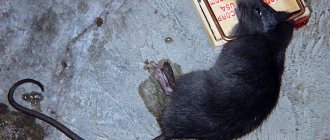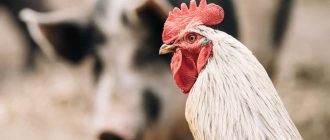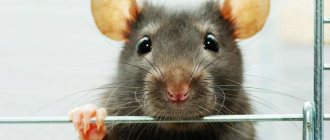Teeth grinding
This phenomenon usually accompanies the bulging of the eyes described above. There is no need to be scared, the rat belongs to the rodent family, and its teeth are constantly growing. When a rat grinds its teeth, it tries, so to speak, to moderate their growth, to make sure that they do not grow too quickly. Moreover, teeth grinding in rats is similar to purring in cats - this is what they do in moments of relaxation and peace. This creates vibrations that help the eyeball protrude - therefore, these two phenomena are interrelated. At the same time, a rat may grind its teeth when it is scared or in pain, so pay attention to the circumstances under which this happens (for example, when you pet it or vacuum near the cage).
Original publication: 10 Common Rat Behaviors. Author: Laura Doering.
What do rat sounds mean?
All rodents are characterized by certain methods of transmitting information to their fellows. They communicate not only through movements, but also using their voice. It turns out that every sound has its own meaning: to warn, to scare, to protect. Listen to your pet and very soon you will be able to recognize his needs and learn to talk to him.
Squeak
As you know, all rats can squeak, however, not everyone knows that squeaking can vary in tone, intensity and emotional coloring:
- The rat makes a quiet, calm squeak when it experiences positive emotions, for example, at the sight of its owner or when communicating with him;
- a long, shrill squeak signals that the animal is very frightened of something and is trying to notify others of the danger;
- a loud but sharp sound made by a rodent indicates its bad mood and reluctance to make contact at the moment.
Important! A rat can be very frightened by switched on household appliances: a vacuum cleaner, blender, coffee grinder. Therefore, while using them, it is better to take the animal’s cage to another room.
Grunt
Sometimes you can hear a rat quietly grunting through its nose. This is usually a sign of relaxation and enjoyment. If similar sounds occur regularly and are repeated for a long time, you need to show the animal to a veterinarian to make sure there are no pathologies. Often this symptom is accompanied by rhinitis or lung diseases.
Chirping
Rats can produce a very strange, chattering sound that occurs as a result of the rodent's teeth chattering frequently. This signal means a warning of danger. If the animal behaves restlessly and you can hear chirping, you need to check the room where the cage is located. Animals often behave this way when they notice cats or pigeons outside the window.
Wheezing when breathing
Breathing accompanied by wheezing is ignored by many rat owners and is completely in vain. If an isolated case can be discounted, then the regular occurrence of such a symptom may be an alarming signal. Most often, wheezing is a sign of respiratory infections (bronchitis, pneumonia), and such a sound can also appear when heart disease occurs. In such cases, you need to provide the animal with rest, do not pick it up and take it to the veterinary clinic as soon as possible.
Did you know? Rats have the highest level of intelligence of all rodents and are as trainable as dogs.
Hiss
Like any other living creature, rats are susceptible to outbursts of aggression in stressful situations. A clear indication that the animal is seriously angry is an angry hiss. If at this moment there are other individuals near the animal, it is better to move them away to prevent conflict. Also, do not pick up your pet until it calms down.
Whistling
When a rat wants to attract someone's attention, it makes a characteristic sound in its throat, like a whistle. This way the animal can call its owner to play and communicate. If there are several rodents, you can hear the males periodically whistling with increasing volume. In this way, they notify females that they are ready to mate.
Coughing
If you hear your pet coughing, observe him. A healthy, vigorous, active animal can thus frighten its fellows or other animals. This is normal behavior; males begin to do this when defending the position of leader. If the rat’s behavior changes, it becomes lethargic, along with coughing, weakness or anxiety appears, you should not postpone a visit to the doctor.
Did you know? In the journal Science in 2016, the results of a study were presented that confirmed the presence in the rat brain of a center responsible for the reaction to tickling. The experiment showed that the animals even emit a high-frequency sound, like laughter.
Sneezing
A rat can sneeze for various reasons, such as strong odors, mechanical irritation of the nasal mucosa, and colds. As with coughing, sometimes this is an attempt to dominate other individuals. It is necessary to check how often the sound is repeated, whether there are any drafts, and evaluate the behavior of the animal. If signs of illness are present, examination by a specialist is required.
Hiccup
When overeating, hypothermia or fright, the rodent may develop hiccups. As a rule, it goes away on its own after a while. If your rat hiccups constantly, this may indicate digestive problems or parasite infestation. In such cases, you need to change the food and also show your pet to the veterinarian.
Grinding of teeth
Quite often you can hear a rat quietly grinding its teeth. At such moments, the animal’s body may even vibrate slightly. But there is no reason to worry, because this is how the rodent expresses bliss. If your pet begins to grind, you can rest assured that at that moment he is absolutely content and happy.
Vocalization
We are accustomed to thinking that rats and mice are quite noisy animals. They tend to really actively communicate with each other using various sounds. Most of these sounds, however, cannot be distinguished by the human ear - they are in a higher frequency range. If you have a cat or dog, then you have probably noticed that from time to time they raise their heads and look intently towards the cage with rodents. Nothing surprising - it’s just that the cat or dog has become an unwitting listener to a conversation that is not “intended” for your ears.
The range of sounds that we do hear is quite narrow. As a rule, this is a very ordinary squeak, which means irritation, sometimes play or even a fight. You are much more likely to hear rat noises if you have two or more rats.
What sound does a wounded animal make?
The loud, piercing squeal of a wounded rat cannot be confused with anything. By the way, this is not the only reaction to injury. Aggressive animals may begin to hiss, and if the pain is too severe, they may become silent due to a state of shock.
Wounded animal
Often, decorative pets receive injuries to the tail or limbs - broken paws, torn nails, cuts, splinters. First aid will consist of treating the wound with any disinfectant. To stop bleeding, you can take hydrogen peroxide.
Rat body language
Do you think only dogs can wag their tail? No – a rat’s tail can also tell a lot about the mood of its owner. The rat carefreely waves its tail from side to side - it means it’s glad to see you! Almost a dog, right? But the tail seems to twitch, or even freezes in one, sometimes unnatural, position - this is anxiety. Moreover, the rat is ready for defense!
Severe fear or stress is expressed in rats by the fact that the tail “walks” with a large amplitude. The animal is most likely very agitated and is clearly “out of its mind.”
Rats often use their front paws as a means of communication. They can wave their paws to attract attention. They may “bounce” with their forelimbs, indicating to be left alone. The treat will also be carefully grabbed by the front paws, and the expression on the face will tell you a lot!
The rat can sit down, slightly stooped or hunched, its muzzle is raised high, its paws are ready for “work”. This is a defensive pose, the rat is ready for aggression. There is no need to pester your pet at this moment. Let him burn out, calm down, and rest.
You can often notice that the animal’s fur seems to stand up and bristle. This indicates stress, fear, and also that your pet is simply cold. Move him to more comfortable conditions!
Why do rats squeak?
Both wild and decorative rats talk to each other not only through movements and touches, but also use a variety of sound signals for this purpose. By emitting various signals, rodents warn each other about possible danger, about readiness to mate, or declare the inviolability of their territory. Tailed pets also communicate with their owners using sounds, thus expressing their love, gratitude or dissatisfaction.
Can pet rats hiccup?
Hiccups in an animal occur against the background of:
- overeating;
- nervous excitement;
- hypothermia;
- helminthic infestation.
If the case of hiccups is isolated, then there is no need to worry - perhaps the rat has simply eaten too much. If attacks of hiccups occur periodically, then you need to think about changing food and carrying out preventive deworming.
Important! When hiccups are accompanied by heavy, wheezing breathing, take your pet to the vet immediately. There is a high risk of pneumonia or pneumonia. Without proper treatment, this can lead to the death of your pet.
How do rats talk?
In general, decorative rats behave quite quietly and make various sounds only when communicating with the owner or in other circumstances that cause emotional reactions. As discussed earlier, a rodent mainly uses squeaking or grinding its teeth to contact humans.
Important! If a rat wheezes and cannot get up, you should absolutely not pick it up; you must transport it to the veterinarian directly in the cage to avoid complications.
Animals communicate with each other using high-frequency sounds that people are unable to hear (about 120 decibels). However, if we are talking about a fight, attracting a female, or communication between little rat pups by their mother, then in such cases most often the rodents hiss, whistle or squeak.
Behavioral features
Rats detect any changes in the owner's voice, so raising your voice or using brute force for punishment is not acceptable. A frightened animal will become downtrodden and wild.
Try turning the guilty rodent onto its back. In nature, such punishment is used by the leader of the pack, so the rat realizes guilt and is filled with respect.
With a good attitude, the pet becomes imbued with love and begins to show talkativeness (coos, chirps, grunts). But even in this case, all sounds have their own interpretation and contain an obligatory subtext.











